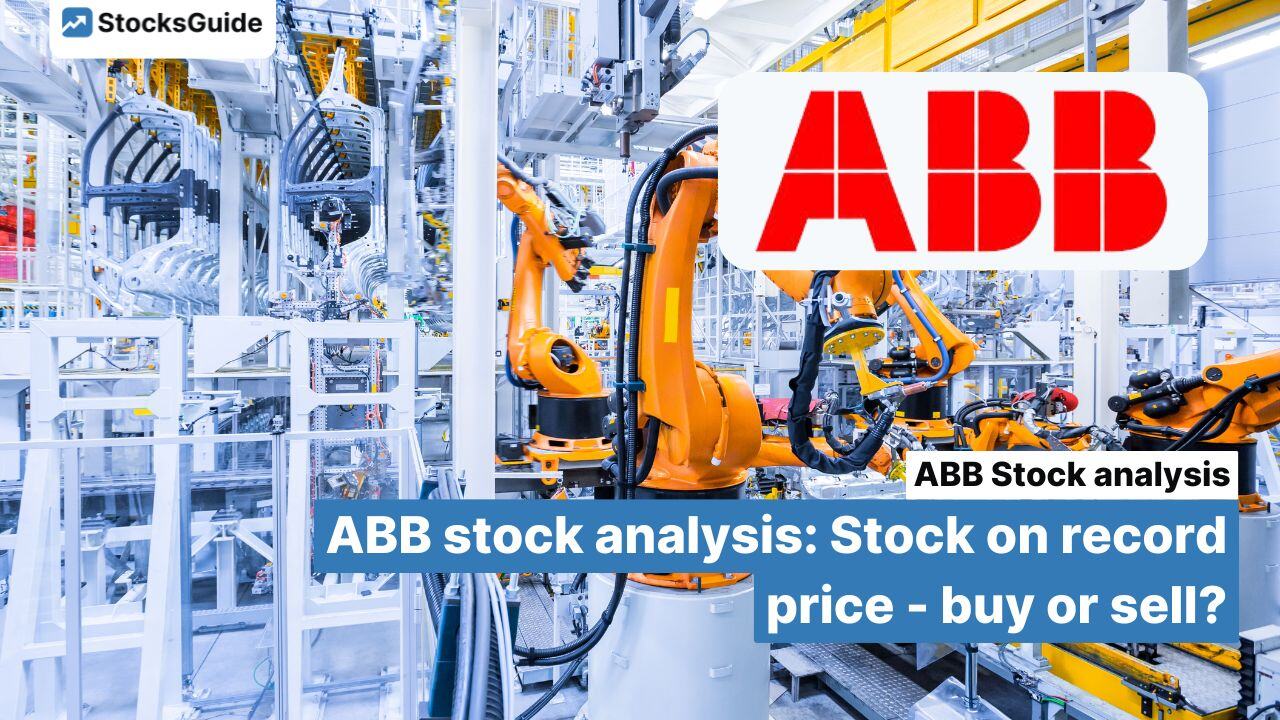Table of Contents
In a dynamic global economy, businesses are challenged to adapt to profound changes. These include digitalisation, the energy revolution and increasing demands for automation and efficiency. ABB (ISIN: CH0012221716) is a Swiss company that is benefiting from these megatrends. As a leader in electrification, automation and robotics, it is uniquely positioned. Its corporate strategy is based on innovation and the continuous expansion of its portfolio to meet the challenges of Industry 4.0 and the global transition to renewable energies.
The stock price is also anticipating this vision: this year alone, it has risen by 32%. Over five years, it has risen by 140 per cent.
Source: ABB stock price, StocksGuide
Despite the good stock price performance, ABB is struggling to deliver. Expected low single-digit growth over the next few years is relatively high for the stock's valuation, with a price-to-earnings ratio of around 26. This begs the question of why investors are willing to pay such a high valuation for ABB. The answer may lie in the company's structural strengths and the long-term megatrends from which ABB is benefiting. The following ABB share analysis takes a closer look at the key factors that could support the valuation and future potential of ABB shares. Will ABB shares still be a buy in the end?
The most important facts in brief
- ABB is a leading power and automation technology company
- Growth potential lies in energy efficiency and automation
- Despite intact megatrends, growth is not picking up
- The P/E ratio of 26 could be too high, but affordable for a quality share
Company profile ABB - large power and automation technology group
The history of the ABB Group began in 1988 with the merger of ASEA of Sweden and Brown, Boveri & Cie (BBC) of Switzerland, two companies that both had a long tradition and significant innovations in electrical engineering. ASEA, founded in Sweden in 1883, initially specialised in electric motors and power transmission. BBC, founded in Switzerland in 1891, was a pioneer in electrification, turbines and generators. The merger created a global company that combined the strengths of both companies to become a world leader in electrification and automation. In the decades that followed, ABB developed innovative technologies in power distribution, digitalisation and robotics, with an increasing focus on sustainability. Today, ABB operates in more than 100 countries and is a leader in providing smart and sustainable electrification and automation solutions. ABB's business model is based on providing technologies and solutions that improve energy efficiency and productivity in a wide range of industries and infrastructure. ABB organises its activities into four main segments: Electrification, Motion, Process Automation and Robotics & Discrete Automation. Each segment offers specialised products and services to meet the individual needs of customers in different markets.
Source: Financial Report 2023 ABB
ABB's Electrification segment develops solutions for the distribution and management of electricity in buildings, industrial plants and public infrastructure. The main objective of the products is to ensure a reliable and efficient energy supply that is also sustainable and environmentally friendly. Products include switchgear, fuses, transformers and control systems for low and medium voltage distribution. At the same time, ABB's products promote the integration of renewable energies through intelligent energy management solutions and digital technologies. They help customers optimise energy consumption and reduce costs. With annual sales of $14.6 billion, the segment accounted for the largest share of the more than $32 billion in sales from continuing operations - 45 percent. The segment continued to grow at 7 percent in fiscal 2023, a slight improvement over the prior year's growth of 6 percent.
The Motion division focuses on electric drives and motors that play a central role in improving the efficiency of machines and industrial applications. ABB offers frequency converters, electric motors and generators that are used in a wide range of industries, including automotive, metals, paper, water and mining. ABB's motion technologies are designed to minimise energy losses and reduce customers' operating costs by improving the energy efficiency and reliability of their equipment. A key focus is on intelligent motors and the digitalisation of drive control, which enable predictive maintenance and optimised operational management. The segment accounted for around a quarter of total sales in fiscal 2023. At 16%, it is the segment with the strongest growth, but it is also subject to strong fluctuations, as shown by the 2% decline in growth in 2022.
In Process Automation, the third largest segment, ABB helps companies improve the automation and efficiency of their operations. It covers all aspects of the process industry, including oil and gas, chemicals, mining and water treatment. ABB offers comprehensive automation solutions based on the use of sensors, control systems and software. These can be used to make production processes more efficient and safer. In addition, thanks to digitalisation and the use of artificial intelligence, production processes can now be precisely monitored and controlled. Customers benefit from lower energy consumption and resource requirements. The Process Automation segment focuses on systems that can monitor and control complex, safety-critical processes. With annual sales of USD 6.3 billion in 2023, the Process Automation segment accounts for just under 20% of Group sales. Although it grew by only 4% year-on-year, this was significantly better than the negative growth of 3% in 2022.
Finally, the Robotics & Discrete Automation segment specializes in providing intelligent and flexible automation solutions for industrial production processes. It is the smallest business unit and most recently accounted for just over 10% of total sales in fiscal 2023. ABB develops and sells robotics technologies and automation solutions used in industries such as automotive, electronics manufacturing and logistics. Its robotics solutions help companies automate their production processes. At the same time, they increase efficiency and precision - added value that can ideally secure or increase market share for customers. The focus is on collaborative robots that can interact closely with human workers, as well as autonomous transport systems that optimise the flow of materials in production environments. Using advanced sensors, machine learning and artificial intelligence, ABB is driving the development of flexible, intelligent production solutions in this segment. This enables customers to respond more quickly to market changes and increase their competitiveness. The division recently posted very strong growth of 14%. However, this is also due to recovery effects. In fiscal 2022, the segment's sales growth declined by 4% to USD 3.2 billion.
Together, the four business units offer comprehensive solutions that help industrial customers improve their efficiency, sustainability and competitiveness. Each segment is focused on addressing the unique needs of specific market sectors and establishing ABB as a leading provider of solutions for intelligent and sustainable electrification and automation. Motion and Robotics & Discrete Automation are leading the way in terms of growth. However, their high growth is also the result of recovery effects.
Market peculiarities and megatrends
The market in which ABB operates has a number of special features. A key factor is the increasing demand for sustainable, energy-efficient and digital solutions, driven by the global transition to a low-carbon economy. Customers from various industries such as energy supply, automotive, manufacturing and infrastructure are now looking for precisely those technologies that lower energy consumption and reduce emissions. Another market-specific trend is the increasing integration of digital and smart technologies into infrastructure and production. The so-called Industrial Internet of Things (IIoT) enables companies to collect and analyze data in real time, which increases efficiency and productivity. ABB has established a leading position in this area by equipping its products with smart sensors, cloud connectivity and AI functionalities early on to enable predictive maintenance and optimization.
An important point is the long-term nature of many projects, particularly in the areas of energy supply and automation, which often require development cycles lasting several years and high investments by customers. This project business must be understood by investors. Customer budgets often extend over several years. In economic downturns, these are then quickly postponed. For ABB, this means a cyclicality typical of industrial companies. However, ABB benefits from its global presence and its broad portfolio, which offers customized and modular solutions for various industries. These are important factors in a highly competitive environment.
Source: ABB Financial Report 2023
The regions of Europe and the USA clearly dominate the sales base here. China, on the other hand, is quite insignificant for an internationally active group with a 13% share of sales. Growth here was also not convincing. The USA was clearly the growth driver.
Competitors of ABB
Unfortunately, the market for electrical engineering and automation is also fragmented. ABB competes with other global industrial groups that also focus on innovation and technology. As the industry is highly regulated and characterized by high safety standards, continuous investment in research and development and close customer relationships are necessary to remain competitive. ABB faces tough competition, particularly from other global technology groups that also offer solutions for electrification, automation and robotics. The main competitors include Siemens, Schneider Electric, General Electric and Rockwell Automation. They are all represented in several geographical regions, have a broad product portfolio and invest heavily in research and development in order to keep pace with ABB or even take over technological leadership.
Source: Peer group comparison of ABB share market capitalizations, StocksGuide charts
Siemens is one of ABB's strongest competitors; the Germans offer a similarly broad portfolio, particularly in the fields of electrification and automation, and also focus strongly on digitalization and the Industrial Internet of Things. With its own Insights Hub platform, formerly known as MindSphere, Siemens is a leader in the field of industrial cloud solutions and enables customers to use data from their machines and systems efficiently.
The French company Schneider Electric competes with ABB in the field of energy technology and building technology. Schneider is a leader in energy management and automation solutions that are primarily aimed at sustainable and smart building technology. The Paris-based company has an extremely strong focus on sustainability and develops systems to increase efficiency in energy distribution and energy management, reducing energy costs and CO2 emissions.
Another important competitor is General Electric. The Americans have a long tradition in power generation and distribution and were considered Siemens' closest competitor, but have fallen into a restructuring spiral due to their high level of debt and complex group structure. In its core business, General Electric competes primarily in large energy infrastructure projects and has strong expertise in high- and medium-voltage technology. The company is also an important player in the field of automation for industrial applications.
Last but not least, Rockwell Automation is also a strong competitor - particularly in the field of industrial automation and control systems. Rockwell is particularly strong in the United States. Here it offers specialized solutions for automation in the manufacturing industry. With expertise in sensors, controls and software solutions, Rockwell has made a name for itself as a leading provider of integrated automation solutions.
Each of these competitors has specific strengths that pose a challenge for ABB. With all major players now focusing on digitalization and IIoT, the competition is increasingly focused on developing intelligent, connected systems that optimize processes in real time. ABB counters with innovation, global presence and the combination of electrification and automation solutions in various industries.
Takeovers are part of the business
Acquisitions have a long tradition at ABB and play a central role in the company's growth strategy. For decades, ABB has relied on strategic acquisitions to expand its own product portfolio, drive technological innovation or develop geographical markets. They help ABB to pick up on emerging trends at an early stage and strengthen its position in key areas such as automation, electrification and digitalization.
Major acquisitions in ABB's history have shaped the company. ABB itself was created from a merger. M&A is therefore practically part of the DNA. Another striking example is the acquisition of the US company Baldor Electric in 2011, which secured ABB a strong position in the US market for electric drives and motors and strengthened the Motion division in the long term. In 2018, ABB also acquired the Industrial Solutions division from General Electric - not only a strategically important step to strengthen its presence in North America. It also brought with it important expertise in the areas of electrification and energy management. ABB is pursuing a clear strategy: the acquired companies should complement the existing business and be integrated in the long term so that ABB can benefit from their technologies, market knowledge and customer networks.
Source: ABB Interrim Report Q3/2024
Smaller, targeted acquisitions have recently been made, such as the Födisch Group in the field of emissions measurement and the SEAM Group in the field of services for industrial buildings. Such acquisitions are often smaller building blocks, but help ABB to expand specialized technologies in high-growth segments. ABB's M&A strategy is ultimately geared towards not only acquiring new technologies, but also ensuring their integration into the corporate culture and processes. Work is ongoing to integrate acquisitions into the performance culture so that they meet long-term business objectives and drive innovation across the organization. Through its acquisition strategy, ABB remains a leader in a rapidly changing market. At the same time, it is well positioned to respond to future changes and technological advances.
Source: ABB Q3/2024 balance sheet data, StocksGuide
The traces of this M&A history can also be seen in the balance sheet. Long-term liabilities amounting to 8.8 billion Swiss francs weigh like lead on the balance sheet of 34 billion Swiss francs. Goodwill has also reached a considerable size. Together with intangible assets, it accounts for more than a quarter of assets at 10 billion Swiss francs.
The latest ABB quarterly figures from September 2024
ABB recorded an overall positive performance in the third quarter of 2023 and made significant progress despite challenges in some areas. While sales fell by one percent to 7 billion Swiss francs, a slight increase in sales of 2 percent was recorded in US dollars. In the end, net profit rose to 821 million Swiss francs or the equivalent of 947 million US dollars. In Swiss francs, this corresponds to growth of 5 percent.
Source: ABB quarterly figures Q3-2024, StocksGuide
The company benefited in particular from strong demand in the field of electrification. This development helped to offset the weakness in the other segments and supported ABB in maintaining its margin at a record-breaking level. Another positive aspect was the continued strong cash flow, which gives ABB a solid foundation to achieve its growth targets for 2024. In the third quarter, it reached a value of almost 1.4 billion Swiss francs.
The company is particularly well positioned in the area of short-cycle orders, which underlines its rapid response to market changes and its access to emerging trends such as renewable energies, infrastructure and data centers. ABB also strengthened its business through two smaller acquisitions. The Födisch Group is expanding its offering in the field of emissions measurement and analysis for the Process Automation segment, which is expected to contribute USD 55 million to future annual sales. In the Electrification segment, the service portfolio was supplemented by the acquisition of the SEAM Group in the USA, which is expected to generate annual sales of around USD 90 million in the future.
ABB stock forecast 2024
ABB expects a solid fourth quarter of 2024, even if growth is only likely to be moderate in the end. Sales growth is expected to be in the low to mid single-digit range - similar to the year to date. This cautious optimism tends to reflect ABB's realistic assessment of a dynamic market in which seasonal fluctuations and challenges in certain segments such as Robotics & Discrete Automation continue to be felt. The seasonal pattern, with an expected negative book-to-bill ratio and a slightly lower EBITA margin than in the previous quarter, is in line with the usual expectations.
For the full year 2024, ABB nevertheless expects a positive book-to-bill ratio and a solid EBITA margin of over 18 percent. Comparable revenue growth is estimated to be below 5 percent, emphasizing ABB's focus on sustainable growth rather than excessive expansion. ABB is thus demonstrating a balanced strategy that addresses short-term challenges while focusing on long-term stability.
Source: ABB sales and margin forecast to 2028, StocksGuide
With regard to long-term growth, analysts are also optimistic about the future. Sales growth is expected to continue in the mid single-digit percentage range. Synergies and economies of scale should ensure above-average growth in net profit. This is expected to be in the high single-digit percentage range in the medium term. A net profit of four and a half billion Swiss francs could be achieved in 2028.
Key figures for ABB stock from the Levermann analysis
The Levermann analysis for ABB yields a value of four out of a possible 13 points, which suggests a good assessment for the share.
Source: Levermann-Score, StocksGuide
Key factors that have a positive impact on the valuation are the high return on equity of 28% and the solid EBIT margin of 14%. Both stand for strong profitability. The equity ratio of 35% is also considered stable and indicates a healthy financial structure. Full marks were awarded for all three criteria. The same applies to the expected profit growth. At almost 13 percent, it is clearly in double figures. In addition, ABB's share price has risen by a remarkable 54 percent in the last twelve months, which speaks in favor of the share. This was awarded a further point in the Levermann analysis.
However, some criteria weigh on the result. For example, the P/E ratio 5 years and the expected P/E ratio. They are quite high at 27.3 and 26.4 respectively. The ABB share could therefore appear somewhat expensive. In the Levermann analysis, there were corresponding deductions for both valuation ratios.
Analysts' opinions and earnings revisions for the coming years, on the other hand, are inconsistent and do not contribute positively to the valuation. The current momentum and the share price performance of the last six months do not add any points either, which could indicate a certain stagnation in the share price momentum.
In summary, the Levermann analysis shows a solid, but in some cases highly valued share, which impresses with its high profitability and long-term growth potential. ABB is financially well positioned and profitable, but the share may already be fairly or overvalued in the current market environment.
Valuation of the ABB stock
With a current P/E ratio of just under 27 and an expected P/E ratio of 26, ABB shares tend to be classified as expensive. Especially as it is a large corporation with a tendency towards weak growth. Double-digit sales growth is not to be expected in the medium term either. Double-digit earnings per share are also unlikely in the long term. A look at the cash flows does not improve this picture. The EV/FCF multiple is still a high 25.
Source: ABB stock valuations, StocksGuide
However, investors are willing to pay a relatively high P/E ratio for ABB stock, as ABB offers a stable and future-proof business model with attractive long-term prospects. In addition, ABB is strongly positioned in the key industries of electrification, automation and robotics, which benefit from long-term megatrends such as sustainability, digitalization and the transition to renewable energies. These trends are likely to ensure growth and robust demand for years, if not decades, to come.
Another important factor is ABB's innovative strength, which makes the company a leading provider in these areas. By investing in research and development as well as through targeted acquisitions, ABB secures a technological pioneering role and remains competitive, which increases its attractiveness for investors. The strong market position and broad portfolio also protect the company from economic fluctuations and enable pricing power and stable margins - even with weaker growth. Investors also appreciate ABB's solid cash flow and reliable dividend policy. The company generates strong cash flows that enable it to pay dividends continuously and potentially buy back shares.
Source: ABB stock dividend history since 2005, StocksGuide
In a market environment where safety and quality are in demand, ABB is positioned as a "quality play" on the capital market - an asset with stable revenues, robust margins and the potential for long-term growth. Even with low short-term growth, these arguments could justify a higher P/E ratio.
Conclusion on the ABB stock
ABB shares are undoubtedly benefiting from numerous megatrends, but in the short term little of this is noticeable. In the current year, sales growth is only in the low single-digit range. Analysts do not see much more potential for growth in the long term either. This is a shame, as the current already high valuation with a P/E ratio of 26 would be far too high against this backdrop. Despite only moderate growth in the short term, ABB shares could remain an attractive investment for several reasons. Firstly, there are the long-term intact megatrends such as electrification, automation and the energy transition. They not only offer ABB stable sources of revenue, but also the opportunity to further expand its market leadership in key sectors such as renewable energies and industrial automation. This is the tailwind that investors want for their investments.
Despite a higher price/earnings ratio with only low single-digit growth over the next few years, ABB's stability and profitability in a cyclical market cannot be overlooked. The solid return on equity, high EBIT margin and sustainable business model give investors the security they need. In a volatile market environment, ABB also offers the prospect of benefiting from global megatrends in the coming years. For investors who are looking for solid long-term returns and want to invest in promising, innovative industries, ABB could therefore continue to be a recommendable choice - even if short-term growth is rather moderate. However, high future returns are not to be expected from this share for the time being due to its ambitious valuation.
Source: Analyst opinions on ABB stock, StocksGuide
Analysts see it the same way. Only 10 percent of them currently recommend the share as a buy. Almost as many see the share as a sell. The majority of analysts (67 percent) recommend holding. The average target price of 49.76 Swiss francs is below the current share price.
If you would like to receive new investment ideas and free stock analyses selected according to the Levermann, High-Growth Investing or Dividend Strategy by email every week, you can now subscribe to our free StocksGuide newsletter.
The author and/or persons or companies associated with the StocksGuide own or may own shares in ABB. This article represents an expression of opinion and not investment advice. Please note the legal information.




